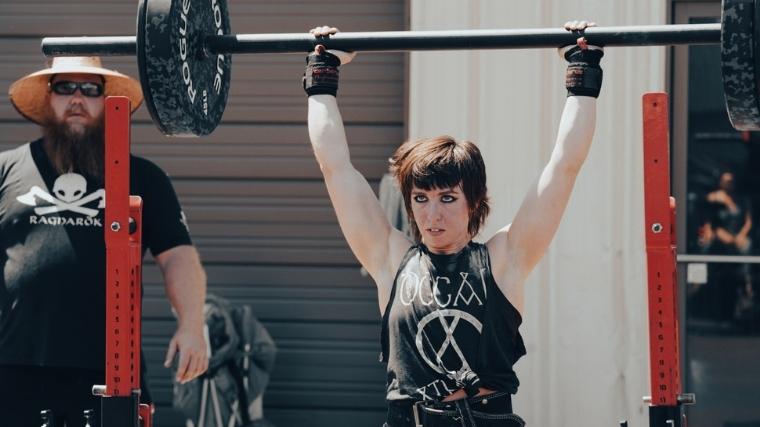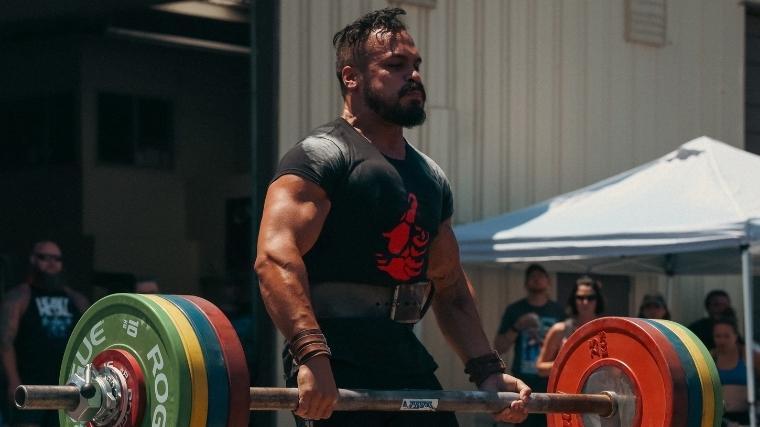If you compete in strength sports, you should compete, at least once, without preparing for it.
No peak, no six-month plan. Pick a local contest and show up.
If you’re preparing to compete at a high-level competition of some kind — like Nationals or Worlds — this message probably isn’t for you.

Editor’s note: This article is an op-ed. The views expressed herein and in the video are the author’s and don’t necessarily reflect the views of BarBend. Claims, assertions, opinions, and quotes have been sourced exclusively by the author.
If you have never competed or have only been competing for a few years, but always under strict preparation parameters, then you may benefit from diving into a competition with minimal prep.
Here’s how to do it: Pick a local competition a few weeks or days out, continue your training as usual up until a week or few days prior, and then throw down. The water’s fine.
Spontaneity Enriches Presence
Since early 2015, I’ve competed in about 27 strength sports contests, mostly in strongwoman. I’m relatively seasoned (although not quite a salty veteran). I love competing, and sometimes I place well (third at two national level strongwoman competitions — United States Strongman 2018 in the 165-pound class and Strongman Corporation 2020 in the 160-pound class, respectively).
In April of 2021, I competed at Untamed Strength’s “Into the Pit” strength challenge, an unsanctioned strength contest held in the parking lot of their gym in Auburn, CA. That’s right; some competitions are run without an organizing body’s approval, recognition, or media. The only goals are to show up, have a good time, and see how strong you are.
In June, I returned to Untamed Strength to support my fiancé Ben Claridad for his axle world record attempt. His record attempt would be during the intermission of a sanctioned Strongman Corporation competition, “Wrath of the Strongest.”
A day before his attempt, I was informed that the competition was short one middleweight woman, and they needed a person to hold the class so that the winner could qualify for Nationals. I don’t need much excuse to perform in any capacity. I had taken a few days off training to travel to California, and so I was about as unprepared as I could be.
In both instances, there was no reason not to do the show. I wasn’t in preparation for any significant competition. Why not just see what I could do?
I had the most fun I’ve maybe ever had at both contests in competition. Although, I’ll attribute my joy at least partly to the fact that I have accumulated decent experience and have learned how to relax into my performances more. (I’m an actor; competing is performative for me.)
Competing completely impromptu caused me to examine my competitive experience; to ask myself why an unplanned event evoked more positive emotions than many of my previous experiences. I landed on the realization that the desire to control the outcome and pin my enjoyment on purely external metrics had been sucking the joy out of competing.

Overplanning, and worse, overthinking, can rob us of the riches that the competition can bring.
An unplanned and spontaneous competition can get you deeply in touch with what ethnobotanist and psychedelic philosopher Terrence Mckenna called “the felt presence of direct experience” — doing the thing and really being in it.
Competition can be one of the most potent motivators and drivers of long-term success and growth. Competition can also limit our experience and ability to evaluate our own processes, especially when we tie it to a drawn-out, hyper-planned schedule overburdened with expectations and the social and psychological baggage of big competitions.
There is a ton you can gain and learn about yourself (and a lot of fun to be had) by diving headfirst into a competition without any prep.
The Federation Is Irrelevant
There are multiple federations and sanctioning bodies if you’re a strongman athlete or powerlifter. Federations help provide financial incentives, media attention, and audience building to hopefully inflate the former two, to get an athlete’s accomplishments recognized and rewarded (and the federation owners paid).
A federation’s primary job should be to help sports promoters and athletes organize and compete — facilitating the actual event and making it as fun, challenging, and compelling for all involved as possible.
If an event has long rules meetings, disorganized equipment, and poor organization, it creates a sort of mental drag on the whole affair, effectively sucking the life out of what could be a grand day for all involved.
It’s hard to run a national level or large competition, so this is not a criticism of “big comps” or federations. However, large stages are not the end all be all of the competitive athletic experiences. I feel bad for lifters who think it’s a waste of time to do anything but their qualifying requirements as fast as possible and then solely prepare for Nationals or Worlds or any other high-level competition.
“What federation should I compete in?” is a question I’ve heard asked by many novice strongman athletes. To this I say, it doesn’t matter — compete as soon as possible.
If you are new to competing, who runs the event is only as important as their ability to pull it off. Suppose you’re worried about whether it will qualify you for Nationals. In that case, you may be the person who will benefit from completely forgetting whatever grand Sistine Chapel you’ve painted in your head about your “strength career” and spending some time learning how to mix paints and draw figures. Get back to basics.
Forget About Outcomes
What if you decided to ultimately not care about the outcome beyond the day of competition? How much could you open yourself up to enjoying the experience more? How much more likely would you be to cheer on fellow athletes, bond with new friends, and help out? There are so many subtle moments that often arise when winning is on the back burner.
Winning and setting PRs is dope, don’t get me wrong. If I didn’t care about those things at all, I wouldn’t compete. But the competition experience has so much more to offer.

Many well-traveled athletes will tell you from experience that if your participation in strength sports is incentivized by external validation in the form of accomplishments, whether it’s money or Instagram clout, you may be waiting a long time to feel good.
Strength sports vary globally in popularity, participation, and financial opportunities, and there are many avenues to success as an athlete or fitness professional. But it’s impossible to ignore how the lures of the current era have influenced the general perception of success in strength sports: validation, fame, attention, and most recently: internet notoriety. You can boil all of these draws down to external validation.
External validation is nothing to shrug off or try to act above — it’s a critical element of how people relate to and trust each other. You do something cool. I tell you I think it was cool and ask your advice on technique, validating your efforts. Now we are bonding.
But this bonding and trust-generating impulse is easily warped and bloated to the point of obscuring experiences we actually enjoy.
As more people participate in life through their screens, competing for validation by screaming into the void for scraps of attention, likes, and notoriety can remove us from any meaningful or compelling processes.
I want strength sports to become more popular for their true value: showing us that we are capable of incredible feats, deep perseverance, dazzling power, and heartfelt support of each other.
When we pin too many social or externally based hopes on competition, we create a mental prison that restricts what this event can be for us.
Competition becomes a thing you have to think about after the fact: what will you say on social media, what will you tell your gym crew, what will people think about you, will you disappoint your coach, and so on.
Some of these things will vary in importance depending on who you are, and I’m not saying they have no importance. However, social validation can become very distracting from the actual competitive acts and thus from the joy of the experience. (Not to mention, in a concise amount of time, almost no one will think about your performance, except you.)
Rediscover What You’re Competing For
Competing in strength sports can range from somewhat challenging and exciting to exhausting. Even if you’re a fairly casual lifter, the stakes can be very high. Let’s not forget these are essentially extreme sports.
Competition is a way to test your courage, your mind, and your body. That can be done in many different ways. You declare your goals to your immediate community and plan and talk about them for months, and sometimes there is a huge benefit to that, like accountability.

One of the major downsides I see for less seasoned lifters is setting expectations and leveraging their growth and enjoyment on whether those expectations were met.
How many times have we read or heard “I didn’t put up the numbers I planned on” or “I didn’t have the day I wanted” in someone describing their competition process?
What if you didn’t want anything other than to show up, try your hardest, and pay attention to yourself? What if you completely relieved yourself from expectations and preconceived notions of what you can and or should be doing?
I’ll go one step further: If you’ve only been training a few years, you have no business even having expectations of certain numbers. You have no idea what you’re capable of. Most people’s seemingly rational grasp of their physical capacity is a joke. Game-day PRs are a thing for a reason. The combination of a meaningful pursuit, adrenaline and a group screaming at you will often push out feats far beyond what you had ever done in training.
Recent (and past) experiences have proven to me that these more spontaneous days are some of the best days you will ever have, not just as a lifter but as a person; they have more to do with your ability to be present than how much you worry about it ahead of time. We create limitations on our own experiences and lives when we constantly try to control, understand, and plan every single thing.
When you release the need to prove something by hitting specific numbers and giving over to a spontaneous experience, you can open yourself up to performances and feats that are far beyond what you could have planned. You don’t have the time to ponder, plan, or try to control the experience before it happens.
Just Have Fun
I know, I know. You’ve ascribed an incredible amount of personal identity and meaning to your pursuit of strength. I used to bristle at the idea of “just having fun,” as if fun were an insult to my sacrosanct discipline. I was above fun. Or so I thought.
I’m not some older lifter who remembers the “good old days” of backyard strongman competitions with all handmade equipment where you only found out about it through word of mouth (although I’ve done enough parking lot competitions to consider myself well-seasoned).
In 2015, Strongman Corporation Nationals was a pretty packed affair when I started competing. There was a system and expectations, and I became enamored with the idea of strength sports. My second nationals was one of the worst competition experiences I ever had because I put unrealistic expectations on myself and, as a result, had a miserable time.
I’ve learned my lesson. This isn’t to say that you shouldn’t have big goals. That said, as much as we value hard training and competition experience, there is an equal amount of wisdom, joy, and gains to be had from not planning at all.
It can take an unplanned, spontaneous event for us to remove our minds from the train tracks of thought we have grooved our identities into. We operate in rhythms and habits — the things we do every day, the thoughts we think.
For the average lifter, training and competing can become a sort of sacred activity — an event we elevate beyond the many mundane tasks of everyday life. We emotionally elevate it, and it gives us a lot back.
The shadow of this elevation is to project onto it the same binary “Fail and be punished, or win and be ‘successful'” mindset that many of us have absorbed from the broader 9 to 5 corporate Overculture.
But as we hold it up as important, we can project many of the same psychological pitfalls that plague us in life, like beating ourselves up when we fall short of the expectations of others (or what we think others expect of us). We start to behave and perform to cope with the pressures of performance in the working world and apply the same thought binaries of “successful” versus “unsuccessful” to a physical discipline that can give us so much more than any black and white performance evaluation.
I see strength sports as a way to reconnect to the visceral animal spirit that exists within us alongside our cerebral mind. This “animal spirit” craves challenge, stimulation, and meaningful work. Strength sports can give us that, especially if we free the “animal” up to be truly present with any given endeavor.
You don’t lift well when you’re preoccupied with other people’s lifts or performances. You lift well when you are present.
An unplanned competition is a perfect antidote to the over-planned, over-rationalized approach to strength sports that can vampirically drain the delight out of them.
If you’re reading this deep in prep and know your goals, and feel confident in your plan, then that’s awesome. I’m sure your coach doesn’t need you showing them this article and saying, “Coach, I think I should max out a few weeks before game day.” If you have committed yourself to something, see it through.
But maybe, big picture, especially if you’re starting, you can afford to be a little more spontaneous, look for the opportunities all around you to challenge yourself, be present, and connect to other wild lifters like you.
Not everything can be tracked in a spreadsheet.
Featured Image: Michelle Lee